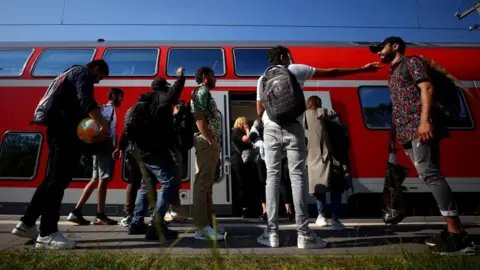Germans say goodbye to summer of €9 travel tickets
 Reuters
ReutersGermany's summer of low-cost travel is over as transport chiefs call a halt to their cheap fares experiment.
For three sunny months, passengers have packed on to platforms and concourses to take advantage of a single monthly ticket costing €9 (£7.50; $9).
In all, 52 million of the tickets, which allowed them to use any regional or local public transport an unlimited number of times, have been sold.
But the offer ends at midnight on Wednesday, to the dismay of many.
"It's one of the best ideas we've had," said Chancellor Olaf Scholz.
And the scheme, reckoned to have cost more than €2.5bn in federal government subsidies, has, it seems, been a political and social success.
Take Ute and Jürgen, who I met at Berlin's main station as they waited for a crowded train to the coast. They were pensioners, they told me, and being able to use the ticket for their usual bus and tram journeys had been "very helpful", especially at a time of rising costs.
That was the original aim of the €9 ticket, which was actually introduced as somewhat of an afterthought.

Germany's coalition government had decided to lower fuel tax for drivers for three months in response to soaring energy costs - and Mr Scholz came under pressure from within his own ranks to do something to help those who used public transport too.
But of course, there were hopes, particularly among the Green politicians in the coalition, that the cheap ticket might trigger a change in habits too.
They've been encouraged by the response of people such as Barbara, who was struggling with a bike trailer and her two young sons as the family waited for a train to the Baltic Sea.
They'd decided to leave what she described as the family's gas-guzzling people carrier behind. "The cheap tickets meant we could make the greener choice," she said.
It's not yet entirely clear whether or to what extent Barbara represents the rest of the population.
According to the German Transport Association, the scheme will have led to a reduction of 1.8m tonnes in CO2 emissions. But the calculation - based in part on research which suggests the cheap ticket had lured people to use public transport, rather than their cars for the first time - has been disputed by some experts.
Nevertheless, as commuters brace themselves for a more expensive autumn - the fuel tax reduction also ends on 1 September - there are all manner of suggestions being discussed about how to replace the €9 ticket.
Most proposals centre on a monthly ticket for a fixed price.
Many would welcome that, if only because, like the €9 ticket, it would replace Germany's confusing and complicated fare system.
The scheme earned Germany's coalition government political points with voters, but the subsequent dithering over what do once it ends risks alienating them again.
And despite many calls for an extension, no replacement is expected to come as cheap as the one enjoyed by Germans this summer.
